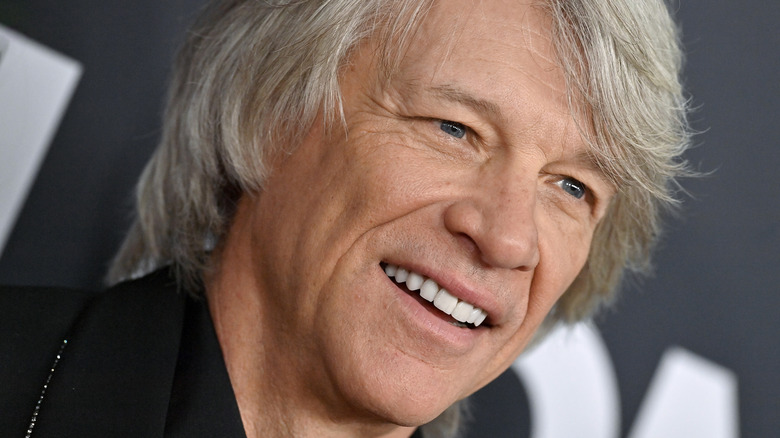Bon Jovi's Feud With The Rock & Roll Hall Of Fame Explained
In the pantheon of rock legends, Jon Bon Jovi is generally considered one of the good guys. While other stars have gained reputations for being unreliable, have bitten the heads off live animals, or pushed the boundaries of excess, Bon Jovi has maintained his image as a professional at the top of his game, a family man who married in 1989 and had four children and has done little to attract scandal. His career as the frontman of his band, also called Bon Jovi, has seen him enjoy considerable success as a stadium act since the mid-1980s when the band ruled the charts with pop-metal classics like "You Give Love a Bad Name" and "Livin' on a Prayer."
But despite Bon Jovi's incredible popularity and the era-defining nature of some of the band's best-known music, even in their prime, the band was the target of music critics who decried its radio-friendly songwriting and lack of edge, as well as its members' model looks. Despite being one of the biggest bands in the world, Bon Jovi has long struggled to receive critical respect, much to Jon Bon Jovi's frustration, especially when it came to their extended exclusion from the prestigious but often controversial Rock & Roll Hall of Fame. Here's how Bon Jovi found themselves in a feud with its founders, and how the band eventually triumphed.
A stellar career
Bon Jovi is an incredibly successful band. In their imperial phase, three of their successive albums, 1986's "Slippery When Wet, " 1988's "New Jersey," and 1992's "Keep the Faith" each went on to sell more than 10 million copies across the globe, according to All Music. In the 1990s, they found themselves still able to attract an audience at the height of the grunge movement with the release of solid albums like 1995's "These Days." Nevertheless, their continued success was met by critics with back-handed compliments, such as a contemporary review in Rolling Stone that describes the band as a "guilty pleasure."
By 2000, Bon Jovi had been one of the biggest stadium acts in the world for more than a decade, and began the new millennium with the platinum-selling album "Crush," featuring the international hit single "It's My Life." And their live credentials similarly diminished little: with more than $1.35 billion in ticket sales revenue as of 2019, per Pollstar, Bon Jovi's tours have remained among some of the highest-grossing on the planet in the 21st century.
By the time of Bon Jovi's 20th anniversary in 2004, the band was such a commercial juggernaut that they were in a position to name their rarities and outtakes boxset, which came out that year, "100,000,000 Bon Jovi Fans Can't Be Wrong," in reference to the estimated 100 million units the band had shipped by then. Surely such numbers would put Bon Jovi at rock music's top table?
Eligibility
For many veteran rock stars, there is no greater honor in the music industry than to be inducted into the hallowed Rock & Roll Hall of Fame. Founded in 1983 by industry figures including Atlantic Records' Ahmet Ertegun and Rolling Stone publisher Jann Wenner, the Hall of Fame began inducting classic acts in 1986, beginning with such luminaries as Buddy Holly, Little Richard, Elvis Presley, and Chuck Berry. Since then, inductees have included early rock acts such as The Beatles and The Rolling Stones, to more modern performers working in disparate genres, including Public Enemy, Green Day, and Kiss.
According to the website of the Rock & Roll Hall of Fame Foundation, artists become eligible to be nominated for induction 25 years after the record of their first record, while induction is intended to recognize the contribution an artist has made to popular music. Bon Jovi became eligible in 2008, but for years it looked as if the band couldn't get a look-in.
Bon Jovi vs. Jann Wenner
Jann Wenner served as the chairman of the Rock & Roll Hall of Fame Foundation for decades. Frustratingly for Jon Bon Jovi, he is not a Bon Jovi fan. In a recent biography of Wenner, "Sticky Fingers" by Joe Hagan, the publisher is quoted as stating in regard to Jon Bon Jovi: "I don't think he's that important ... What does Bon Jovi mean in the history of music? Nothing" (per The New York Times).
It has been speculated by many fans that Wenner was personally responsible for preventing Bon Jovi from entering the prestigious Hall of Fame, possibly on the grounds that the often critically maligned band didn't meet the criteria for entry. The New York Times reports that induction is based on "an artist's musical influence on other artists, length and depth of career and the body of work, innovation and superiority in style and technique," per the official wording, suggesting that even with their immense commercial success and loyal fanbase Bon Jovi's entry to the Rock & Roll Hall of Fame may have been a lost cause.
However, Bon Jovi has shown he is willing to fight his corner, questioning the critical belief that the band doesn't qualify for entry. He has also been open about his feud with the Foundation, though he has not named Wenner directly, telling Howard Stern that he had "choice words" for those members he met, according to Vulture.
A rigged nomination?
Though Bon Jovi became eligible to be inducted into the Rock & Roll Hall of Fame as early as 2008, for the first few years the band didn't even receive a nomination. Their first came in 2011, but despite Bon Jovi's immense popularity, they didn't get through.
Various outlets such as Page Six have reported the omission as an intentional "snub," and indeed for years after the blockbuster band failed to receive another nomination. Jon Bon Jovi himself claimed people were suspicious of their exclusion and their lack of induction the one year they did happen to be nominated, telling Billboard: "The first time when we were nominated ... and ultimately didn't get in, there were a lot of conversations about were we legitimately not voted in, was there a little bit of covert action going on, and we'll never know." According to Page Six, in the years that followed Jenn Wenner's power at the Rock & Roll Hall of Fame gradually ebbed away, and, sure enough, there was soon a change in Bon Jovi's fortunes.
Finally inducted
It took until 2018 for Bon Jovi, who by then had sold more than 120 million albums, to take their place in the Rock & Roll Hall of Fame alongside the most legendary names in the industry. Having received over 1 million fan votes, which counts as one vote in the overall judging which is decided by a panel of around 1,000 music experts, Bon Jovi's inclusion was announced alongside that of such legends as Nina Simone, the Cars, Dire Straits, the Moody Blues, and early rock guitar hero Sister Rosetta Tharpe.
In an interview with The New York Times, Jon Bon Jovi spared no words in exclaiming what his band's induction meant to him. "We're very happy about it ... It's great ... I really want to say it's about time," with the newspaper claiming that an expletive was omitted from the quote. He went on: "Am I relieved? Yeah. Am I pleased? Absolutely. But ... it's about time," pointing to the incredible success of his recent live tours.



